#some fans prefer the drama of the past and it still impacting the present until the characters find resolution and peace if they can
Explore tagged Tumblr posts
Text
I think it's pretty well established now that Edelgard and Dimitri are foils to each other in that one looks to the future and the other to the past and that's a huge part of why their outlook on the war and what they went through is so different, but I haven't seen it pointed out and discussed yet that a good chunk of their classmates follow that theme as well.
(I haven't seen all the Blue Lions' supports so this is in general, from the Academy phase's supports I've seen, which means I may lack a specific example one way or the other, but is still globally accurate, at least for their Academy phase)
In the Blue Lions House, based on the students' supports with each other, the most obvious are Ingrid, still mourning and resenting the loss of her fiancé, Felix, still mourning the loss of his brother and focused on that one day he saw Dimitri rampage and those two things being basically the only things that inform his decisions, and Dedue, who literally tries to push EVERYONE away because of how still hung up on the Tragedy of Duscur the Kingdom is and how anyone who spends time with him would be shunned for it (though he does look forward to Dimitri's reign because he believes Dimitri will change things in Faerghus, but most of his supports are still based on the Tragedy of Duscur still impacting his life to this day). Sylvain also fits because bad past examples and relationships have taught him that women are only interested in his blood line ; he doesn't ever talk about finding someone who would think differently, for example, he stays hung up on the past and doesn't even consider the future, at least not as something that could bring a change. Mercedes is less hung up on her past, though still quite focused on what happened to her mother, her brother and herself and wanting to find her brother so they can be happy again, like when they were children. Annette and Ashe, from what I've seen, don't fit the theme.
In the Black Eagles House, the most obviously focused on the future are Dorothea, who talks about her past but only to explain why she's so focused on securing a good future for herself, Ferdinand, who can't SHUT UP about becoming Edelgard's Prime Minister and guiding her in her reign, Petra, who holds a grudge against Caspar's father for killing her own, but whose supports pretty much all mention her desire to make Brigid an equal to Adrestia and ensure a bright future for her people, and Caspar, who is focused only on getting stronger to carve his own path in life. Hubert, of course, being aware of Edelgard's plans, is also solely focused on the future, though always only related to Edelgard and her goals, never his own person outside of his work ; Linhardt is neutral, as he focuses only on Crests ; Bernadetta has been traumatised by her past, but she's not hung up about it, she's only focusing on how afraid she is in the present, so I'd say she's neutral as well.
It always struck me as odd that no one, among the Black Eagles, ever said a word about the Insurrection of the Seven, Edelgard's time in the Kingdom when she sought asylum there, or Edelgard's siblings when, in comparison, the Blue Lions wouldn't SHUT UP about the Tragedy of Duscur and the Faerghus Four's childhood friendship. Even Edelgard and Hubert barely ever mention that they knew each other as children (Edelgard only tells you once, in Hubert's introduction I believe, that he has served her since she was a child) and the others never mention any time spent with Edelgard as children (the only ones who admit they saw each other often as kids are Caspar and Linhardt, but it doesn't even really come up in their supports, when the Faerghus Four's supports with each other are FULL of reminders of their shared past). Now I think it's to further emphasise the themes of their houses : the Black Eagles represent rebellion and the desire to shape their futures the way they see fit while the Blue Lions represent order, discipline and the shackles of the past.
It's really super interesting on a meta level. I haven't played VW yet but I'm curious to see if a similar theme is shared through the House, or if it's a patchwork of different goals and focuses, to represent how disparate the Alliance is and how they can never make a unanimous choice.
#fire emblem three houses#black eagles#blue lions#side note but that may be part of why the fandom is so divided between their fave houses#some fans prefer the drama of the past and it still impacting the present until the characters find resolution and peace if they can#others prefer storylines where the past forged the characters' persona and views#but they're not held back by it and instead focus on their future and how to make it better than their past#that's also why I like Byleth's storyline in CF the most (based on what I know of the others)#they get fused with Sothis without their consent and in 3/4 routes it means they end up running the Church with or without the country#no real agency they're just symbolically the best for the job and have to fix past mistakes#in CF however their actions (killing Rhea and yeah I assume that's the thing that prompts the disparition of the Crest Stone#the fact that Byleth made the decision to kill Rhea to free Fodlan of her hold and unconsciously also rejecting Sothis at the same time#''when humans stand together there's no need for gods'' so Byleth rejects the god in her to go back to being human)#anyway their actions in CF lead to them rejecting Sothis' power and everything that comes with it including expectations for their future#meaning they finally get the agency to decide what they want to do and how they want to help#instead of the Lord/Rhea telling them ''I entrust you with this'' and not being able to really say no#Byleth rebels and shapes their own future
45 notes
·
View notes
Text
Neverland, the role of “nostalgia” in Kiuzna’s narrative, and the 02 quartet’s unusual immunity to it
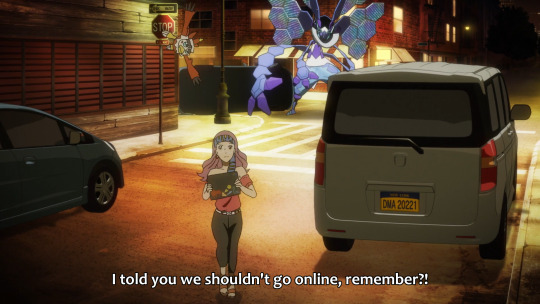
In general, the 02 quartet (my shorthand for the four human characters introduced in 02 who weren’t in Adventure, namely Daisuke, Ken, Miyako, and Iori) have a position in Kizuna that you can call “shockingly favorable” in that they’re kept safely out of the most dangerous parts of the plot in ways the others aren’t. This especially sticks out when we get to the Eosmon incident reaching its climax, when Takeru and Hikari are placed in the same situation as their Adventure seniors, despite the movie and its surrounding media generally portraying them closer in line with the others in the 02 group than the Adventure group.
To be a bit blunt about it, the obvious main reason the story is set up this way is meta -- a lot of the climax’s effectiveness depends on the audience getting sensory impact via recognizing things from the original series (including 02 as well; how convenient it is that all of the international Chosen are in the positions 02 fans would recognize!), and so it’s obvious that said climax would evoke imagery related to the series that was Digimon Adventure, while the 02 quartet would be treated extra-kindly by the narrative due to the need to give them compensatory action screentime given certain real-life events. But just because the originating reason is meta doesn’t mean there isn’t also a story reason for it, especially considering the relevance of 02′s themes in Kizuna’s narrative, and the surrounding circumstances regarding both series.
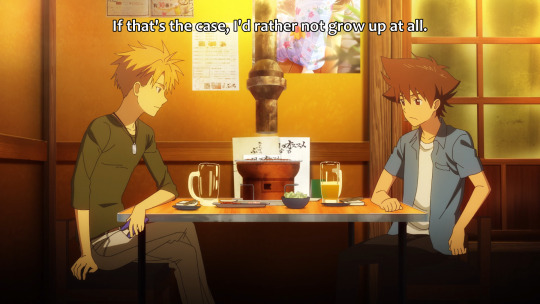
Before we get into anything else, the first thing that needs to be established is that Menoa and Eosmon’s lure is pretty obviously depicted as working on a subconscious level. This is why everyone else in the narrative agrees that what they did is “kidnapping”, despite her insistence that she’s just doing what they wanted. While they can’t not admit to having moments of weakness, nevertheless, it’s likely that most if not all of the people Menoa kidnapped consciously knew better and had learned better lessons than this a long time ago; if Menoa had consciously offered Neverland to her victims, most of them would have probably said no! But as Daisuke said back in 02 episode 49 -- when he witnessed his own friends being subjected to something similar at the hands of BelialVamdemon -- there’s no sin in having feelings of worries or troubles (and, by extension, irrational feelings in general), and Eosmon’s abilities and Neverland happen to be able to directly target them. In fact, we ourselves got to witness this internal conflict when Menoa made her direct offer to Taichi and Yamato to join Neverland; they briefly considered it because of the circumstances, but were snapped out of it quickly with Agumon and Gabumon’s intervention, and were really, really mad at themselves for considering it shortly after.
We saw the process of how Ayaka became one of the kidnapping victims at the beginning of the movie -- it happened right after she complained that she wasn’t fond of the idea of becoming an adult at this point. So it does lend some truth to the idea that Menoa’s working off something with these cases, and that Eosmon did specifically target people who had those wishes to some degree. Moreover, note carefully how this kidnapping (and some others in the movie) is portrayed; Eosmon doesn’t actually emerge from the device in question (it’s obvious that nobody notices the giant butterfly monster), and the victim’s consciousness and partner are whisked away thanks to being caught by the device camera. In Ayaka’s case, because her phone was sitting on the table, pointed at her. The fact that this is not how the kidnappings are portrayed all the way to the end of the movie is a very significant point.
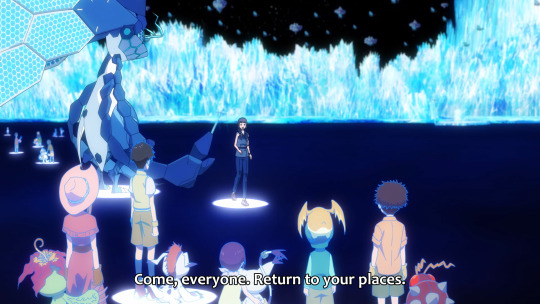
So let’s talk about Neverland and its construction. The whole thing is based on Menoa’s own very, very warped view of what “happiness” is. This means that Neverland is only an “ideal world” or “utopia” in a way that makes sense to her -- and once you learn the full extent of her backstory, it becomes apparent how she came to the mentality she did, and, more pertinently, how she ended up projecting that on everyone else. Hence, how she came to decide that she knew better and should decide for everyone, because she thinks she gets the right to decide on everyone’s happiness based on her own experiences. (She doesn’t.)
The way Neverland is constructed is that everyone has “their own places” -- their own individual islands that recreate “memories” of everyone being able to be together with their partner, forever. So in other words, it’s not just that everyone’s being turned into children; it’s that they’re being kept in an eternal loop of their best memory and unable to “move forward”.
Here are three very significant parts about this, which will be important to keep in mind as we go deeper into this analysis:
Menoa’s view of this utopia requires people to be separated -- for all she claims this is a utopia where people can play together, she discourages fraternizing and encourages everyone to stay only with their own partners. This is, presumably, to lessen complications with said memories, because what might be one person’s best memory might not be for another, and also because she thinks one person being alone with their partner is happiness enough in itself. As we’ll be seeing later, this is very much not the case for everyone.
A lot of these memories in Neverland -- and Menoa’s own mentality, as we eventually find out -- are heavily dependent on the concept of rose-colored nostalgia, or, that is to say, conveniently omitting or forgetting about all of the bad things about one’s past in order to portray it as such a wonderful thing that nobody should ever move on from. And in the end, that probably applies to real-life childhood in general, too; as much as it’s so often put on a pedestal for being a time when “everything was simpler”, you can also easily argue that it wasn’t actually all sunshine and roses, it’s just that the process of forgetting things or the grass-is-greener phenomenon makes you conveniently forget all of the bad things and frustration that came with it too.
Because the concept of needing to stay in the past forever is based on the idea that it’s preferable to growing up, these memories thus have a strong premise of “things you cannot do anymore” -- something that, bar going back to the past and never moving from it, you will never get back or be able to sufficiently recreate. It’s unlikely the islands themselves are one-to-one recreating their specific memories in the way they happened, but rather seemingly presenting them the opportunity to “constantly do over” things they want to recreate or do again, as long as those things are associated with a happy thing that isn’t as easily accessible anymore.
In the case of the five Adventure group members who were brought into Neverland, these “memories” that they’re seen trapped in are, of course, from Digimon Adventure.
It is of course foolhardy to pretend that the main reason for this wasn’t meta, since, of course, there’s a huge point to be made here about the relationship between Adventure and nostalgia, plus the simple fact that this is what we’re most likely to recognize and be nostalgic for, but it also makes sense within the context of the narrative; Menoa has an extreme bias towards the happiness of her childhood revolving almost entirely around her partner, and, of course, Adventure was when these kids first had their most formative meetings with said partners. (This is also probably the in-story explanation for why the other international Chosen from 02 appear at or close to their 02 selves; beyond the meta reason of it being a way to make them recognizable when we only knew them for such a short time, it also approximates when they met their own partners.)
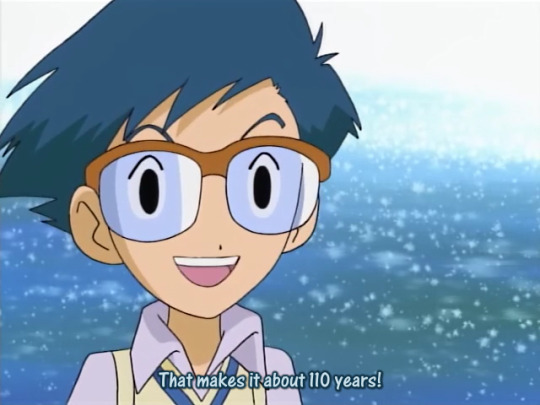
On top of that, Adventure was not all sunshine and roses for its cast! After all, there was a ton of drama and emotional trauma and stress from running away from enemies trying to kill them, or trying to save the universe, and glossing over that is also foolhardy -- but this is also where our concept of “rose-colored” comes in. Menoa’s not offering the kids the entire adventure; she’s offering them a small slice of the moments when they were able to be happy, the moments that made them want to stay in the Digital World for a whole 110 years’ worth of time at the end of Adventure -- she’s basically offering them that very thing they wanted and had ripped away from them at the end of Adventure when the time dilation phenomenon stopped. Take out all of the bad stuff, and suddenly, the events of Adventure seem outright romantic -- it’s the whole school of thought that fueled Adventure’s inspirations of Two Years’ Vacation and Stand By Me, in which a lot of stressful stuff happened and yet you still can’t help but think there was something magical and romantic about it. (I cannot emphasize enough how much of a cultural impact Stand By Me in particular had in Japan, to the point where it’s considered the epitome example of a “coming of age story” and “summer adventure”.)
Let’s take a closer look at what’s on each of the Adventure kids’ personal islands:
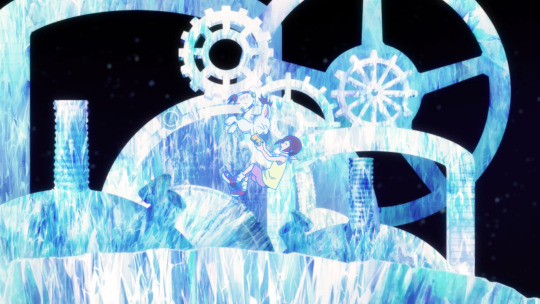
Hikari is probably the one in the most unusual position among this group, since she didn’t join until over the halfway point, and the first arc she got involved in revolved around everyone wanting her and Tailmon dead. Thus, the memory we get to see her involved in is the Numemon factory in Adventure episode 49. Although this was in the middle of the Dark Masters arc (and, uniquely, very close to the end of the series where a lot of stress was involved), due to the limited amount of time she got to be in the Digital World, this was the one time she got to do something really cool and awesome and impressive for herself that had nothing to do with the others (again: see how the requirements for these islands require not fraternizing with friends and being isolated).
One thing that the Adventure kids got to do that wasn’t in play in 02 was that there were a lot of “romantic experiences”, involving strange adventures and things like phone boxes on the beach, and, very significantly, “Digimon friends” -- ones that the kids made a huge note of bonding with over the course of the series. This contributes to a certain sense of whimsy that was involved in this adventure that the 02 quartet ultimately never ended up getting to foster, because the lack of the time dilation phenomenon meant that they spent much less time in the Digital World overall (more on this in a bit), and once the time dilation stopped, it meant that these kinds of “whimsical” experiences were ones the Adventure group was permanently torn away from once that adventure ended. That dropping of the time dilation phenomenon not only cut that initial adventure short, it also prevented any future ones like it from ever happening again.
And, of course, this is an extremely rose-colored memory, because shortly afterwards, the Numemon ended up all sacrificing themselves for Hikari. But hey, when you’re in a space that can eternally loop good memories forever, everything’s fine as long as we conveniently never get to that part, right?
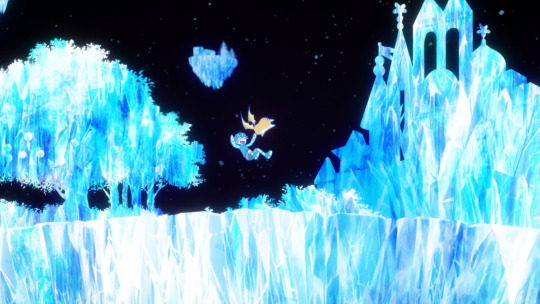
From this point on, you’ll notice that all of the memories that show up on these islands are from before the halfway point of the series, because after that, things started getting increasingly pear-shaped and much more difficult to disentangle the stress, mental breakdowns, and witnessing of deaths from. (Hikari’s probably wouldn’t have come from such a late incident if she hadn’t joined the party so late.) Although there still were looming threats around the horizon in the beginning of Adventure, they weren’t always immediately apparent to the kids at every turn, and in fact, the beginning of the series involved more of a “well, we’re in this situation and probably need to get home somehow” aura than it did a “the world is in danger and all of us might die” aura. (It’s also in direct contrast to the 02 group, who were given the details of the crisis and what they needed to do roughly from the get-go.) So in other words, if you want to have some rose-colored nostalgia about the romanticism of this adventure, these are some of the best episodes to pull from.
Takeru’s is obviously from the Village of Beginnings, corresponding to Adventure episode 12, when he and Patamon got to have a fun romp through the village, play together, meet Elecmon, and learn about how Digimon are born. It’s also very much something he did without the others, only with Patamon, and had a lot of “fun and happiness” associated with (later solo episodes with Takeru had a lot more upsetting events more intrinsically tied with it), and, again, it’s extremely rose-colored -- it wasn’t even a day later when Angemon died in front of Takeru’s eyes. But hey, that’s even more reason to pick a moment from before then to stay in forever! Can’t have trauma if that trauma never happens, right?
Also, note that Takeru is one of the few here who’s confirmed to be aware of the partnership dissolution issue at this point, and, unlike Koushirou, isn’t confirmed to have accepted a forward-thinking mentality about it yet -- this is a very, very prime time for his fears of being separated from Patamon again to have a nasty relapse.
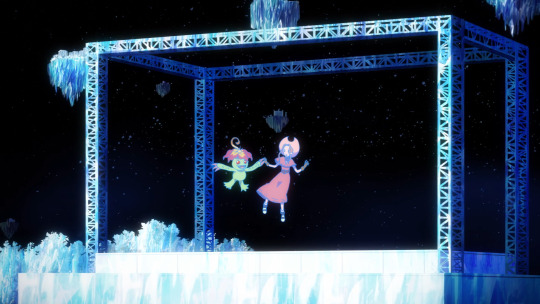
Mimi’s is the closest to the midpoint of the series, from the affair with the Geckomon and Otamamon castle (from Adventure episode 25; the metal railings here resemble the stage railings from that episode). It’s from the period of time that was a “lull” -- when nobody actually knew about the encroaching threat of Vamdemon quite yet, and for all it was worth, there was no longer any danger. So Mimi got to live happily in the comfort of the castle and play around with the Geckomon and Otamamon...which, of course, also conveniently excludes the affair where she went on a power trip, made everyone miserable due to her selfishness, and immediately felt guilt over it.
Mimi’s associations with this incident are not entirely negative; she was clearly still having fun singing for them in the end (note how her clothing during that scene involved her regular outfit, which she has on here), and she still had a positive impression of her relationship with the Geckomon and Otamamon as per Adventure episode 47 and 02 episode 6 (and as per 02 episode 15, even though everyone’s initial encounter with TonosamaGeckomon ended badly, nobody actually has any lingering grudge against him). So if you filter out that whole affair with the power trip and the resulting embarrassment, it was a meeting with a bunch of fun Digimon friends, a romantic little castle, and a fun stage session where Mimi got to sing.
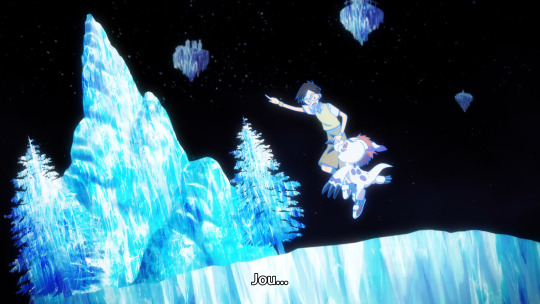
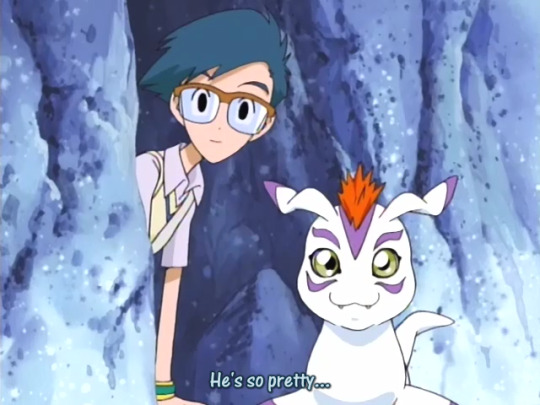
Jou’s refers to the Infinity Mountain incident in Adventure episode 7, and even from the get-go you can already see the level of rose-coloredness in Jou’s gesture -- in the actual incident depicted, Jou went to the mountain out of a sense of obligation and stress, and the initial climbing involved him having a bit of a bickering moment with Gomamon. But once they did get up there, it was actually their first time the two of them got to really “bond” -- and not only that, their encounter with Unimon had Jou even look on it with fascination, before the Dark Gear had ever come into play.
So in the end, Jou really would have found the incident enjoyable and worthwhile if not for that, and from there you can understand why it would be appealing for him to revisit that setting and finally get to have a bit of calm fun with Gomamon there -- especially since, again, the Neverland islands have a very strong preference for isolating the kids from others, and this was one of the few times Jou got to have a major moment of calm like this alone with Gomamon, with a slight reprieve from the constant feeling of stress and duty.
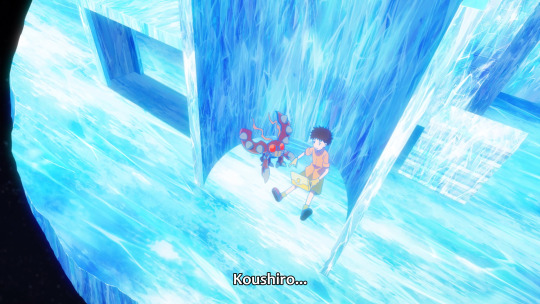
Koushirou’s most prominently resembles the “sealed room” in the factory in Adventure episode 5, and while Koushirou certainly continued to make a large number of exciting discoveries after that, this was the situation where Koushirou, with no one else but Tentomon to worry about in the immediate vicinity, got to have the largest sensation of “novelty” -- where he first came upon the fascinating discovery of data manipulating reality around him, and he actually got to see the world change around him by wiping things off a wall.
And, of course, there were other things going on like Tentomon confronting him with his first existential crisis, and how things quickly went south with Andromon...but we don’t have to remember that part for now, right?
An interesting thing about Koushirou: the circumstances of how he was “kidnapped” in the first place are actually somewhat obscured compared to the other four in this scene, since Menoa presumably needed him conscious in order to get his list out of him, resulting in his kidnapping scene also involving an emerging Eosmon and not having him be instantly taken the way we see Takeru and Hikari (more on this in the section below). It’s thus unclear whether he’d be in their boat had his position in Menoa’s plan not been unusual -- said memories in Neverland involved “gathering information and learning more”, something he still actively involved himself with even after the events of Adventure, and he’s also the first one to reach a forward-thinking mentality about the partnership dissolution phenomenon. Either way, once he was already dragged into Neverland, it’s natural that the place could find a good memory for him in the same way it did for the other kids who were “manually” dragged in, but the actual method of entry and whether Koushirou's post-Adventure life put him in a mindset similar to that of the 02 quartet (again, see below) is a bit ambiguous.
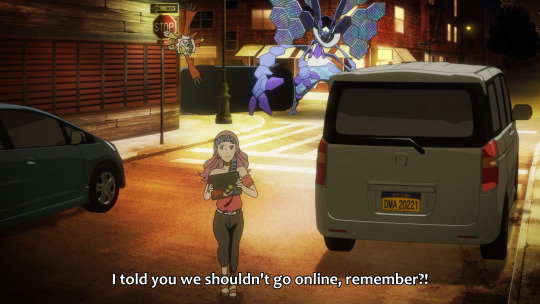
So here’s an interesting part about how the 02 quartet gets involved in this story: their own encounters with Eosmon happen during a part where the method of kidnapping has abruptly changed. As many have pointed out, this is also when the degree of the targets Menoa wanted had also suddenly escalated, because while her previous claims had involved the idea of kidnapping like-minded adults (who, indeed, were entertaining thoughts of nostalgia to even some degree), she was now kidnapping actual children, ones who weren’t even nearly at the point of the supposed drudgery of adulthood that Menoa claimed they would eventually have, and with her arrogantly deciding she knew better for all of them. The part that becomes particularly intriguing about this is that the exact same thing happens with Miyako -- she is explicitly stated to have connected her laptop to the Internet, resulting in an Eosmon physically emerging and chasing her instead of instantaneously snatching away her consciousness through a camera like her own fellow 02 group members Takeru and Hikari.
So in other words, the 02 quartet’s favorable position in this incident doesn’t just have to do with being lucky enough to have gotten Koushirou’s warning about the Eosmon early; they (or at least Miyako) also seem to have a certain degree of outright immunity to it, much like the young children who aren’t old enough to have nostalgia yet. (Also, keep in mind that Takeru was caught thanks to a security camera; “excess caution with electronic devices” alone wouldn’t necessarily have guaranteed their safety.)
Recalling that, for the most part, Takeru and Hikari are usually treated more like 02 group members in the context of this narrative yet are, in this one case, treated as being potentially nostalgia-prone, it stands to reason that the main difference between the two of them and their fellow members in the 02 group is the fact that Takeru and Hikari went on the adventure in 1999, and the quartet did not. So in other words, the reason the 02 quartet isn’t as prone to this is not so much that they’re fundamentally different-minded people, as much as they have a distinct lack of an experience they can be attached to the way the Adventure group is to their own 1999 adventure. (Remember that Menoa’s kidnappings work heavily on subconscious feelings; you can’t blame anyone for having these kinds of feelings no matter how much they’ve consciously learned.)
As I said earlier, it’s foolhardy to pretend that Adventure was all sunshine and roses, and, likewise, it’s also foolhardy to pretend that 02 was nothing but suffering for everyone involved. Both series involved a lot of balancing of funny, silly moments to be treasured as much as they involved stress (which is why people are so attached to both, after all). So the question is not so much how happy they were in their childhoods as much as the nature of what that happiness came from, and what relation it has to their current lives. And when you look at what experiences the 02 quartet had back in 02, you might notice a thread of the fact that it is significantly harder to romanticize the events of 02 than it is Adventure.
Let’s put it this way: Let’s say that the 02 quartet was kidnapped into Neverland and placed onto islands that fit Menoa’s view of happiness. What, exactly, would you pick from 02 itself that would work? What kind of “happiness” did they have back then that’s so romantic, so impossible to replicate now, that they’d want to go back to because it’s better than their lives now once you disentangle all of the bad stuff?
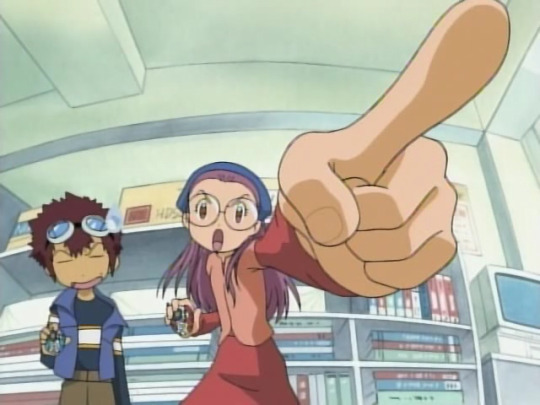
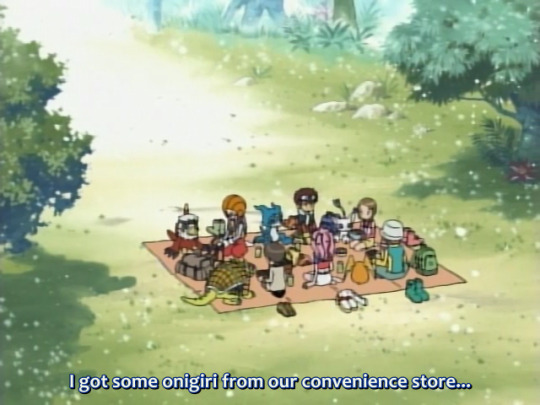
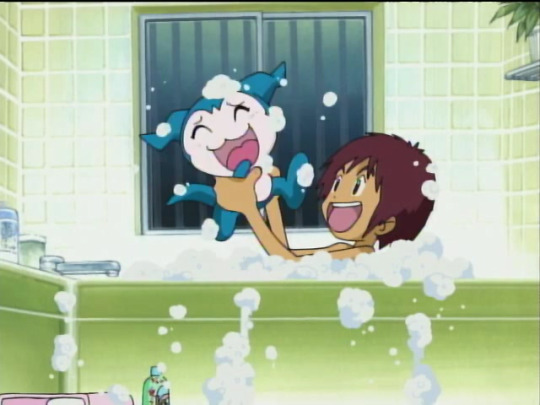
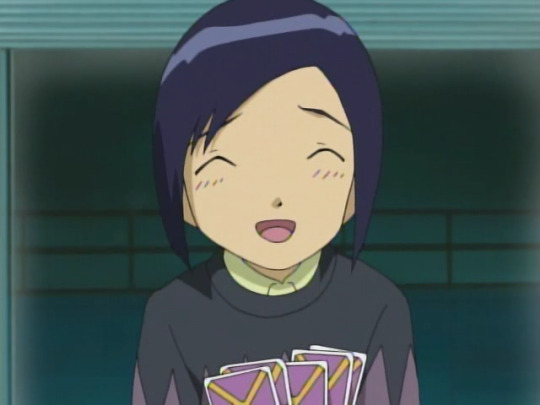
...Not much. Not much at all, actually. Hanging out in the computer room together? Doesn’t seem like they cared that much about the computer room part as much as the fact the others were there bantering with them (which would put a huge nail in Menoa’s islands mandating isolationism). Going out on a picnic together? No reason they can’t just go on another picnic again (and if the BD box is to be believed, that’s exactly what they did, and they even added Ken to it while they were at it). Hanging out with their Digimon in real life and doing silly hijinks? They’re...probably still doing that now, actually. Getting to find true happiness at a Christmas party? That’s a party from the real world (again, something they most certainly continued to do thereafter), one where the happiness came not from the romanticism of anything that happened to do with some adventure, but just the happiness of being surrounded by true friends, which, again, Ken is still clearly getting to do by the time of Kizuna.
Once you look at the circumstances of what the “adventure” of 02 was to the 02 group, you may realize that it doesn’t really resemble the traditional romantic image of an “adventure” much at all. Sure, they were blessed with being able to regularly go back and forth between the Digital World from the get-go, but it meant that -- especially without the time dilation in play -- the Digital World became much less of a picturesque area associated with a one-time memorable adventure as much as something they had to squeeze in their after-hours while juggling it with their school. The circumstances they encountered their Digimon and the Digital World in were at a point where it had a certain level of “mundane” to them, compared to their seniors; it wasn’t a “fantasy adventure in the Digital World” when so much of the story also revolved around real-world events as well, and you can’t really find many “mysterious fantasy” events in 02 that resemble much of those in Adventure. The closest might be...Daisuke seeing Numemon pile out of a vending machine in 02 episode 1? (Not very romantic.) Daisuke getting chased around by a Tortomon in 02 episode 22? (Really not very romantic.) Iori getting to tour the ocean with Submarimon? (Implied to more about relief from how much he was holding himself back than the uniqueness of the experience in itself.) Ken’s long-time-ago flashback from 02 episode 23 about meeting Wormmon for the first time? (Defeating a Gazimon is hardly that impressive; the important part was him bonding with Wormmon, which he’s...uh...still doing now?)
There weren’t any lasting relationships with Digimon friends like the ones in Adventure, maybe encountering some civilians once and not seeing them much again after that, especially since the lack of time dilation meant not getting to spend as much time visiting them much at all (think about all of the really fun experiences that the Adventure group probably had that weren’t shown in the actual Adventure TV series, just because it probably didn’t have enough drama that would make a good TV episode plot). This means that there’s very little, if at all, of 02 that represents something this group would want so badly to recreate that they can’t already do now; everything from back then was either something comparatively mundane, or something they actually would not want back. Unlike with Adventure, where a lot of the kids had irreplaceable moments that only happened to be spoiled a bit later, a lot of the “really awesome accomplishments” from the first half of 02 were explicitly against Ken, someone whom they’d probably rather not dwell on fighting again because of how much they love him now; many of those good memories are “retroactively poisoned” because of that, and it’s much, much more difficult to make a rose-colored version of those memories disentangled from the bad, because of how fundamentally intrinsic that retroactive poisoning becomes.
And, when you think about it, the mandate of “you have to be alone on your own island” would pretty much break these four in particular, especially since the 02 group is portrayed as the type to need mutual support more than anything else, and so many of the events that represent “happiness” specifically involved the happiness of each other being present. It’s not to say that the 02 quartet had no moments of happiness when alone with their partners, but, rather, being with each other provided so much more fulfillment to them that Menoa’s offer of a memory of their past that requires them to be alone probably pales in comparison to anything they could do now in each other’s presence. Maybe, like with the other kids depicted in these scenes, they could be buttered up with something nice if you successfully got them into Neverland, but it’s not like they have any real wistfulness about anything from back then to the point that they’d be subconsciously drawn towards it instead of having to be dragged in kicking and screaming -- and especially in the case of Miyako, the same one who managed to evade an Eosmon here, who was offered a similar “chance to be alone” back in 02 episode 49 and didn’t take very long to decide she hated it because of how much of her happiness comes from getting to be with others.
By the time of the end of Adventure, the Adventure kids’ ideal situation was to have a romantic and fun 110-year adventure with the sights and fun of the Digital World, with all of the weird fantasy surrealism and less of the world-saving, and that’s something they never got to have (and that Menoa was inherently offering them). By the time of the end of 02, the 02 quartet’s ideal situation was...to find a way to get back to normal life and hope their friend feels a little better, and that “ideal situation” is still persisting even into the time of Kizuna, so it’s hard to imagine they really want more than that.
And, again, when you extrapolate this into what Kizuna’s trying to say about real life, adulthood, and nostalgia: it is true that Menoa’s projecting a belief that absolutely does not apply to everyone. While it’s true that many people feel that childhood had a certain kind of magic that you can’t get back in adulthood, there are possibly just as many people who aren’t really all that nostalgic to begin with, either due to trauma or something about their childhoods being miserable, or, even in the lack of such miserable events, simply enjoying the added freedom and expanded range of ability that comes with adulthood to the point they consider it to be more than worth the tradeoff. The 02 group basically represents this crowd -- Ken’s life right now beats out his past in pretty much nearly every respect, and while there are certain concerns about not being able to meet up as often, they’re finding the same ways to do the same kinds of over-the-top hijinks they did back in 02, with arguably even more range now that they get to exploit Digital Gates to do world travel and act without worrying about their parents. They’re basically like the adults who see Menoa’s creed of “childhood is better because adulthood sucks” and go “sorry, can’t relate.”
That said, remember: this isn’t because the 02 quartet is somehow mentally stronger or anything, but rather just a byproduct of what experiences they've had and haven’t had. Takeru and Hikari’s position is unique here -- for all intents and purposes their mentalities are portrayed as closer to the 02 group’s, but they did still have the experience their seniors had and are thus still capable of being close to their position in this one regard. In the end, everyone is different, it’s no sin to have feelings based on those differences, and “being able to relate” to one’s position is also an important key here; because the 02 group’s position is so alien to Menoa’s, it’s unlikely they could have tackled her problems nearly as intimately as their seniors could.
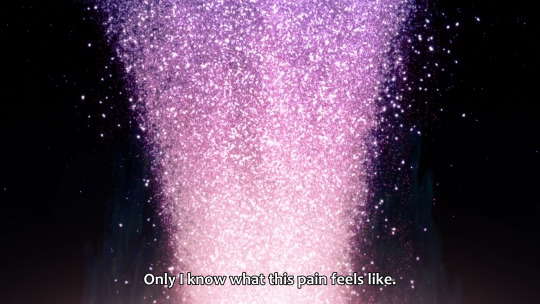
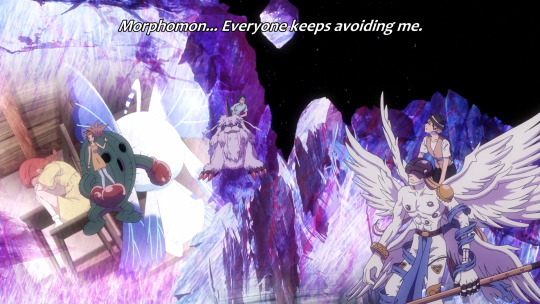
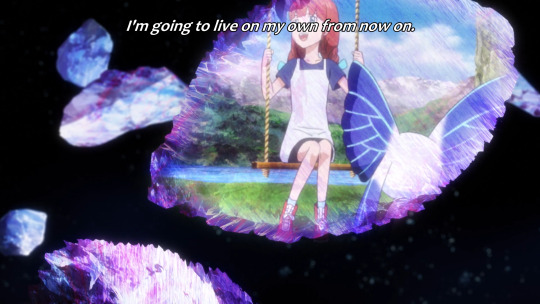
What we learn about Menoa’s backstory establishes that she forced her vision of nostalgic happiness on everyone based on her own perception of her past in such a warped, rose-colored manner. She conveniently omitted or forgot about details such as the fact that her life as a “child” involved feeling ostracized from everyone and that she herself was guilty of neglecting Morphomon. Not only that, she herself claims that she’s the only one who knows what this feels like -- that nobody relates to her -- and thus, you can see that she came to her conclusion that her experiences are universal by the power of sheer extrapolation, hence why she thinks everyone inevitably loses their partner upon reaching adulthood despite pretty significant amounts of evidence to the contrary. (For all it’s worth, the fact that she still considers herself as having “become an adult” at 14 just because she got into university at that time is pretty conceited.)
Menoa’s existence as being so starkly in contrast to the 02 quartet’s is very likely because her entire character was built up from the ground that way -- her entire backstory of skipping grades into university is heavily based on 02′s initial development premise and Ken’s own backstory, meaning she explicitly represents the path that Ken and the other 02 kids chose not to take, and the timing of certain events in her backstory seems almost deliberately engineered to prevent her from witnessing some of 02′s important answers to Kizuna’s conflict, most notably her inability to witness the final battle and the important lessons everyone present learned about following one’s dreams without restraint, and how that relates to one’s partner. Menoa’s mindset is basically that level of incompatible with 02′s themes of “moving on from the past” and “not caving to arbitrary societal expectations”, to the point her character could only get to this point by going out of the way to exclude her from 02′s story and events, because she’s fundamentally built as a character who started off on a very similar path as them (getting to integrate her Digimon partner into normal life, having a similar backstory to Ken) before veering off on a very different one.
Moreover, about that backstory, and the reason why 02 was conceived as such a criticism of the concept of “skipping grades into university”: the concern that someone in this position will be kept from making any friends their age. Menoa puts the moment of “being with one’s partner” on such a pedestal and considers herself to be “the only one who knows what this feels like” partially because she has a fundamentally warped view of friendship itself. Even the Adventure group, which may not have had quite the absurdly tight level of bonding the 02 group had, still broke out of the illusion via Taichi and Yamato reaching out to them, and Taichi and Yamato giving each other mutual support helped them make the decisions they did in the movie. The movie is titled “bonds”, and “bonds” doesn’t just refer to those between human and Digimon partner, but also bonds between each other; Taichi, Yamato, and Sora slowly drifting away from the others at the start of the movie has very strong relevance to their respective existential crises, and the role that Taichi and Yamato play in supporting each other, and Mimi’s in supporting Sora in To Sora and even beyond that, say a lot as to how they’re already expected to be much better off than Menoa was.
It’s not that adulthood is inherent drudgery; it’s that Menoa’s own circumstances really are that warped to the point where she sees her very unusual experiences as fundamentally synonymous with how life is supposed to work in general. She was so obsessed with “being independent”, “being useful to the world”, and “being on her own” that she had no mentality of making friends or connecting to others besides her own partner, and once her partner disappeared, she seemed to make no attempt to rectify that. So of course her life in university following that ended up being not nearly as fulfilling as she’d hoped, since she was getting no real emotional support from anywhere, and, as 02 itself also drove home, apparent “approval from society” only ever makes you as “happy” as a Dark Seed-implanted child if you’re not also being supported by your loved ones in the process. Her adulthood sucked, and she decided that everything about her rose-colored childhood meant that childhood is fundamentally superior in every way, and thus decided that keeping everyone else in it would be “saving” them from the terror it involves -- even though (even if they’re not aware of the specifics of everything) the 02 quartet is not the kind to be able to relate to this at all, and, eventually, Taichi and Yamato, who do understand her position a bit better due to their own experiences, are able to get her to reconsider a little.
#digimon#digimon adventure#digimon adventure 02#digimon adventure last evolution kizuna#kizuna spoilers#shihameta
104 notes
·
View notes
Text
an interview with takahiro sakurai about the movie. translation from @sakiamiya on twitter, from animage magazine.
What did you feel when you first heard a movie is being made? Honestly, it will be better to make comments like, I was surprised, or, I was happy here, I would think. But those weren’t my feelings and rather it was, I won’t put it past them to make one (laughs). This series stirred up this much energy and excitement, and I had already heard from Director Fujita Yoichi and Script Writer Matsubara Shuu-san before that they wanted to try making a long skit. That’s why I thought, “To think they actually went and did it …”
That being said, I couldn’t imagine what kind of story it will be.
If they lined up short stories like the TV anime and then end it with a BOOM! explosion and the words “the end,” the movie will still flow and end properly since it is that kind of show. However, in my opinion, since it will be a film adaptation, I thought I’ll prefer it if it was a dramatic story instead. I believed the movie would be more or less “going all out” with what they have. So it would be nice if they make the story while being conscious of this adaptation being a movie.
And that’s when it became a movie adaptation with that kind of feel.
What did you feel when you received the script and learnt of the contents? It came out with a “good feeling” to it. Not “deeply moving” or “shocking,” but “good feeling.” The Osomatsu-san-like feeling the series has built up until now is properly mixed in, with a bit of fantasy and just a little bit of deep story. It is also a story where you can see the subtleties of the sextuplets’ hearts and how they grew up.
The story is about the sextuplets meeting their eighteen year old selves in the past, right? With a timeslip-like mechanism, you trace back your memories and end up meeting yourself who is still growing—this kind of drama that touches the soft parts of your heart is something I like a lot. I also think it is a movie-like thing too. However, the recording was a lot of work. We have to do both our past and present selves, so, huh? Isn’t this double the workload? Script Writer Matsubara Shuu also said, “You’re right, you have to do it twice,” and apologized (laughs).
What was your impression when you saw the eighteen year old version of the sextuplets? Everyone changed in a way I couldn’t imagine from their present selves. Jyushimatsu is really delinquent, and there are some whose characters have become complete opposites.
There is a huge gap between past Karamatsu and present-sunglasses-wearing-Karamatsu. As for Todomatsu, his youngest feel became even stronger and he’s like a cute girl, which irritated me (laughs). Ichimatsu is pretty much like a normal high school student. However, while there is a gap between him and his present self, you can already see the signs of the soon-to-come “darkness” … is what I feel.
And the one who made the most impact on me, personally, was Choromatsu. He consciously acts as an “honor student” in his own way, but his acting is bad to the point of being really annoying. No matter how many times I watch, it is funny (laughs). Kamiya-kun has done a wonderful, full 100 out of 100 job. These gaps are rather important points in this story.
To begin with, in “Osomatsu-kun”, everyone had the same face and personality and was fun to watch. These sextuplets would then, due to certain chance, try to find themselves in an extremely clumsy manner. That is the sort of impression I got from the eighteen year old sextuplets.
It then turns to “Osomatsu-san” where each and every one of them was given personalities, roles, and unique characteristics. While the sextuplets are shitty NEETs, they can’t be hated and are very human—that’s how the fans see them, and we do too. However, when you unravel the past, you will see the sextuplets had their own mental conflicts until present time. This is how the story of the movie is drawn, to unfold this drama … is the feeling I received.
However … Osomatsu is the only one who hasn’t changed though (laughs). Well, Osomatsu has been put in the position of, You’re the only one who hasn’t changed at all!!
In that case, have you changed your acting between eighteen year old Osomatsu and present Osomatsu? I tried in my own way to be creative, but I also did it while thinking, it doesn’t have to convey (laughs). Two, three years when you’re an adult doesn’t amount to much change. However, for you when you’re still in your teens, isn’t it much more dramatic?
With that in mind, I did try to separate the younger Osomatsu and the later Osomatsu, and come to grips with them, but … They will probably feel the same (laughs).
Please tell us the scenes you liked without giving any spoilers. Let’s see … The present sextuplets who became NEETs will appear in front of their eighteen year old selves. However, the way they appeared is really, really stupid, the worst, and wonderful. The adult sextuplets will also go to disguise themselves with extraordinary choices. Those disguises are why did you choose that?! in the “those disguises are horrible” way (laughs). However, you could feel that it is sextuplet-like, and there’s a strange touching-ness to it.
At times there are really stupid scenes that pop up again and again, like they’re trying to hide their embarrassment. “If you cut these scenes, the movie will become a good, more mature one, you know”—such elements are purposely piled in, which leads to a, “Well, we aren’t really like that,” feeling (laughs). I thought this balance was really good.
Like I said in the beginning, there is a dramatic feel to it from being conscious that this is a theatrical movie adaptation. There is a little bit of bitterness. I think the story is rather moving, or rather, it can make you feel I watched something good. However, even then, the sextuplets are the same as always; the flavor of Osomatsu-san hasn’t been lost. I believe it is because of this series’ power which has been building continuously from the TV anime and Director Fujita’s sense.
Please go and have a taste of the Osomatsu-san that has become movie-like.
#osomatsu#osomatsu san#ososan#eiga no osomatsu san#osomatsu san the movie#i transcribed this .... for no reason other than i'm insane <3#it didn't take me too long but i did rephrase some stuff because my brain kinda automatically rephrased them but like it's 95% just#1 to 1 transcription of the translations from twitter#meta
38 notes
·
View notes
Note
Do you think that if the ghosts sees period dramas set in their time, it will reignite memories of their life?
i think it definitely depends on the accuracy and style of the drama- if they're too poorly researched, any attempts at reverie would be totally disrupted by the historical and visual inaccuracies (think: thomas yelling about the 'roccoco legs' during the byron shoot). of course the other big thing is setting: it's all well and good to watch to a movie set in your time period, but if it's based in a country you've never been to (especially for the older/less privileged ghosts like mary and robin, who probably didn't have much knowledge of the world outside of their continent when they were alive), it's not going to feel particularly familiar.
working on the assumption that we have at least partial historical and geographical accuracy, here's how i think each of the ghosts would respond to
robin: considering how little we actually know about early human history, i don't think robin would be that fussed by any attempt to put that on film- he'd still appreciate a good caveman joke, although he's not a big fan of how stupid every movie assumes they would have been (it's not like they had omega-3 tablets back then!). robin's unspeakably old, and for the most part he seems to have processed through all the parts of his past that he possibly can, and is now committed to enjoying his time at button house as much as he can (a big part of this is his prankster spirit and frankly underrated friendliness), so it would have to take a lot more than a stone age movie to rake up serious conflict.
mary: given her incredibly traumatic death, mary avoids virtually anything that hints of fire or witchcraft which is where things become difficult. i think mary could really enjoy a film set in her time if it follows a working family not dissimilar to her own- it could help her remember some of the positive things from her life, and probably help her feel a lot more seen as she often ends up misunderstood or ignored by the other ghosts (pat initially dismissing mary's advice about the camera work because he didn't think she properly understood what was happening; the ghosts focusing on correcting her speech more than what she actually says). the problem is, almost all movies set in mary's time that follow people from her class end up focusing on the witch trials, which is a BIG no no for her.
humphrey: i think humphrey could really enjoy watching some tudor set films. like mary, he often gets ignored (and straight up left behind), so watching a period film absolutely gives him the opportunity to feel a bit more seen and stew on those long forgotten memories like post-meal games of cards with friends, or the occasional hunting trip when the king came to visit (the trips themselves were more stressful than anything, but mouthing off about them with the king's entourage after he went to bed was always a highlight). humphrey would definitely have a keen eye for inaccuracies, but i don't think they'd bother him. it's just nice to have things be about him for a change (if by him, we mean having all the ghosts watching something that is vaguely related to his alive-period and actually looking to him with questions instead of just using his head as their personal football/security camera/magic 8ball).
kitty: kitty is one of the ghosts who accesses her memories pretty easily- she has no problem with thinking about her life, even when the anecdotes are screamingly sad to anyone listening. so a period film would naturally bring some memories, but i don't know if they'd be anything radical or new- kitty's real growth and drama would come from her leaving behind the rationalisations of what clearly was severe neglect. actually on that note, while not quite kitty's environment, i think she might get a lot out of Sofia Coppola's Marie Antoinette. something about the themes of the loneliness that comes with growing up in high society and only being valued for what your status and your biology can give to your family and your husband (who you likely didn't choose), along with feeling like an outsider and being visibly othered, even by those you outrank, no matter how friendly and approachable and like them you make yourself (while not necessarily linked to the broader themes of familial neglect kitty's character touches on, i think her experiences as a georgian noblewoman of colour would have to have impacted her growing up and also socially- i'd love to hear any thoughts on this from fans of colour, as i'm white and so any theories i could come up with would likely be a poor approximation). and she'd definitely like the pretty dresses and stunning rooms of versailles, and for that i can't blame her.
thomas: most of thomas we sort of got to see in Free Pass- the detail nitpicking, the excitement until a specific trigger from his life (in this case, lord byron, the man thomas considers his greatest enemy, although i’d be curious to know whether byron acually had any idea of thomas thorne’s existence) causes him to go into a full thomas hissy-fit. sure, the emotion is real to him, but he absolutely plays it up, even trying to get humphrey’s body to fetch alison so she can see how ‘upset’ he is (thomas reminds me of a child in this respect). there’d probably be less of the tantruming for a movie that had already been made, although i’m not so sure about the memory point. The Thomas Thorne Affair sort of brought out thomas’s big Unresolved Life Mystery, and now i think all that’s left for him to work through has got to be a lot more internal. sure, he’d be reminded of a few good old parties, and maybe any romance scenes might trigger some of the sad isabelle/general lost love emotions, but i don’t think they’d be anything particularly spectacular.
fanny: now fanny would be a real stickler for accuracy. she would be calling out every makeup, decorative, hair, wardrobe, architectural, and lingual failure with the classic lady button judgement in her voice. this is probably half because she can't help herself, but half a measure to distract herself from actually having to pay proper attention and relive her life. i think fanny struggles a lot with no longer running her own household (along with the shifting morals, and fashions, of the modern world), and so to be reminded of everything she can no longer have would be tough. i'm not saying she would long for a time when women didn't have a lot of rights, but she went from a wealthy society woman who held a lot of power in her own sphere to a ghost, unable to touch anything or even be seen by the living (save for the photo glitch), and stuck spending her days with a motley crew of equally frustrating ghosts whom she doesn't always feel respected by (noting that 'respect' to fanny is much the same as deference). she could have it a lot worse, but i think fanny would much prefer to not have to think about her old life.
the captain: the captain is an interesting one. he's one of the few ghosts who actively seeks out media related to his time, although that's within the impersonal war documentary which focuses on facts and mechanics as opposed to day to day realities and feelings. on the one hand, any war film for the captain would be sure to rake up memories of wartime (even if he never made the front- that remains unconfirmed), and the immense grief that comes with watching the people around you slowly stop returning home. the captain is a war fanatic, and has no problem talking about the great battles, victories, and tactics, so i think the heightened emotional states that a film presents would be the key to unlocking the captain's inevitable wartime trauma and going beyond the surface level facts. for that reason, i'd really like the captain to see Peter Weir's Gallipoli. i know it's the wrong war and the wrong country (although the australian's were technically part of the British forces), but i think the overarching themes of the idolisation of the military, the deconstruction of the glory of war, and the intense (bordering on the homoerotic) although never quite realised relationship between Archy and Frank (which, spoiler alert, ends in tragedy), could give the captain a lot in terms of food for thought and unlocking some of those deeper experiences. on the other hand, the captain watching a period film set in the years before his war could be equally interesting- i think they'd play on some his is insecurities and general issues surrounding the difficulty he may have had fitting in with day-to-day life (not just due to his homosexuel répression, but due to his broader issues with fitting in socially which we see through his interactions with both the ghosts and his own forces- some particularly valid fans have used these to headcanon cap as autistic). in short, films would unlock a fair few memories for cap, but even more EMOTIONS.
pat: with pat and julian it gets interesting because while yes, technically any movie set in a non-current time period is a ‘period piece’, you also have to deal with the fact that they’re going to have less impact on their respective ghosts because you also have actual movies from those periods floating around. for this reason, my answers for pat and julian are relatively similar: they wouldnt have any more memories appear than for any film coming from while they were alive. for pat, this means he’d get pretty excited about ones that came from his childhood (pat would be a giant sci fi fan don’t @ me he loves technology), but i think anything that came with too strong a family attachmet, or that he watched in the weeks/months/year leading up to his death might bring out the angry pat we saw in Happy Death Day and Perfect Day. anger is how his inherent death trauma (and the additional loss that comes from the world moving on without you) manifests, so i definitely think that would come out here, even if he isn’t quite able to put his finger on why specific movies make him so angry/irritated. for pat, childhood memories would abound, but the closer we get to his death, there’s less memories but definitely more unresolved emotion.
julian: see my point above about the whole period-film-vs-regular-film thing. julian doesn’t really strike me as a movie person, and i definitely think he wouldn’t give much care to the influx of 80s/90s set british political media (think The Iron Lady etc). in his words, “i don’t really care for politics, and they’re all too busy trying to push their labor propaganda”. he just makes a captain-inspired noise when alison reminds him that he WAS a politician. julian is another character who accesses his memories pretty easily (although they’re usually either horny or at least slightly morally bankrupt), and i honestly find it hard to give a tory emotions so i’m very excited to see how the christmas special manages. julian is a self-centred bloke though, so i think only things that are directly about him could have the power to rake up buried memories and feelings. now i really want to see julian watching a documentary on himself and just getting outraged.
thanks for this one, sorry for the delay!!
#ghosts bbc#bbc ghosts#bbc ghosts headcanon#thomas thorne#mathew baynton#mat baynton#julian fawcett#simon farnaby#lady button#fanny button#martha howe douglas#dead robin#robin#larry rickard#laurence rickard#the captain#ben willbond#pat butcher#jim howick#mary#katy wix#kitty#lolly adefope#six idiots#horrible histories
68 notes
·
View notes
Text
Yuki Hayashi Birthday Project! 2019 edition
You might not have heard his name, but chances are you heard his music: this amazing Japanese composer is the genius behind the soundtracks for anime like Haikyuu!!, Boku no Hero Academia, Death Parade, Kaze Ga Tsuyoku Fuiteiru, Kiznaiver, One Piece Gold, Ballroom e Youkoso, Dive!!, DRAMAtical Murder etc along with many dramas. Hayashi-san really appreciates having people from different countries listen to his music (tweeting in English and, for example, asking how he can make his music more accessible for overseas fans), and he’s always loved it whenever we would come together to wish him a happy birthday (we’ve been doing it for 2 years, and each time he personally thanked the participants in his own way, and I can tell you that he was pretty emotional :). We decided to do it again this year, so if you appreciate wonderful music in your favorite anime/drama, please dedicate just a bit of your time to thank the hardworking person behind it!
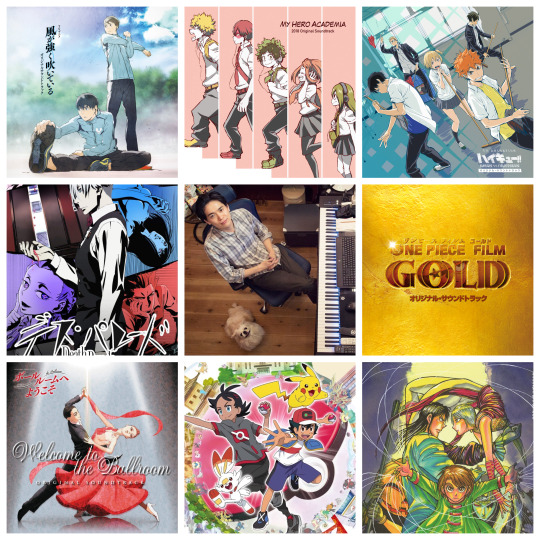
We don’t have much time, since his birthday is December 31st, and yet we decided to make a video (if you’re too shy to record it/don’t have an opportunity, don’t just scroll down, please keep reading). You can participate in this project in 2-3 following ways:
— make a video (preferably);
— take a picture (if you are unable to make a video or if you’re too shy for it, for example);
— if you don’t have an opportunity to do either, but you still really want to participate, do contact me, and we’ll try to figure something out.
The pictures will also be a part of the clip, of course.
VIDEO: you have to make a video of yourself (10-15 sec) where you we ask you to speak about Hayashi-san’s music — how would you describe it, what does it make you feel, what it inspires/motivates you to do. Basically, we want to show just how much we appreciate his amazing music. If you have some personal experience with it, that would be absolutely perfect — the more unique your words, the better. You should speak in your NATIVE language, as it’d show how many fans Hayashi-san has from all over the world. Naturally, we will translate your words into Japanese (and add subtitles).
— the video should be 10-15 seconds long (can be shorter, CAN’T be longer — you can bypass the limit if you have a friend/someone who is willing to translate your words into Japanese (or if you can do that yourself — but please do speak your native language anyway));
— horizontal format;
— GOOD QUALITY (480p at least; if you can’t manage that, better take a picture);
— make sure that you can be seen clearly and that the video isn’t too dark;
— SPEAK LOUD AND CLEAR, preferably without background noise (it’s much easier for us to make your video quieter than make background music quieter so that we could hear your voice, so please, please speak louder);
— if you have an opportunity to record this video in a beautiful place, or near a famous spot of your town, that would be awesome (unless it’s too noisy);
— your pets can definitely take part in the video if you want them to, Yuki Hayashi himself loves dogs (but any pets are okay, really);
— you could also make a video near/with your musical instrument and maybe say something about how his music inspires you to play etc;
— you can use things somewhat connected to the anime that Yuki Hayashi composed music for (like a volleyball);
— please do not go anywhere near CDs/Youtube/any other illegal ways of listening to his music that you probably used in your short speech (unless you actually have CDs);
— please refer to the composer politely — Hayashi-san;
— send us a TEXT of what you’re saying along with the video as it will speed up the translation process significantly (the text should be in English if you’re speaking your native language).
PHOTO: you can take a picture of yourself with a piece of paper and write something nice on it (or you can paste something right onto your picture, but keep an eye on the composition). The content should also be about Hayashi-san’s music (described in detail in the video section).
— the picture should also be horizontal;
— please make sure its quality is high enough so we can clearly see&read everything;
— really shy people can take a pic of their pet instead, hide their face behind the piece of paper with their words on it, or draw something (but drawing is the LAST resort in this particular project);
— please also provide us with a TEXT you write/paste on the picture.
ALL PHOTOS AND VIDEOS should be sent to the following email address titled “Yuki Hayashi Birthday Project”: [email protected]
Please do not forget to send us the TEXT of what you’ve said/written along with the media material!
DEADLINE: the main one is December 1st. DEADLIEST DEADLINE is December 20th. This does NOT mean that you can wait all the way until the end of December to do it. Please, please try and understand us. Last time we did a video-project 2 years ago, we received around 80% of the entries between December 18th-28th, and let me tell you, that was hell. We would like to have enough time to edit everything properly and send it to the composer on time. If you can’t make it before the main deadline (December 1st), please let us know (here, on my Twitter or via email) so we know to wait for you.
There’s also a special service available for airheads like me: message me on Tumblr/Twitter or email me, and I will put you on the “kicking list”, meaning I will remind you about the project from time to time until you send me the stuff (because you can simply forget about it in 2 months, trust me, I know).
EXTRA INFO: Here is Hayashi-san’s Instagram. He really loves his doggos, especially his “daughter” Chloe-chan (we often see her on OST covers). He adores it when people draw her~ A while back Hayashi-san used to do rhythmic gymnastics.
I’ll be attending his concert in January, so if you’d like to send him a letter/present, hit me up!
If you have any questions, feel free to hit me up on Tumblr or Twitter! Also, if you’re experienced in making clips and would like to help, please do contact me, as we could use some more help!
Please, do not sit out on this and join us to make this simple, but heartfelt present for our favorite composer. It won’t be much of a trouble for you to participate, but trust me as a person who saw Hayashi-san’s reactions — the impact it makes is huge, and so, so worth it. Let’s connect and show Hayashi-san that his works are truly loved all over the world! :)
We would be really grateful to everyone who participates! ;>
#yuki hayashi#happy birthday yuki hayashi#haikyuu!!#haikyuu#boku no hero academia#my hero academia#kazetsuyo#kaze ga tsuyoku fuiteiru#run with the wind#pokemon#death parade#welcome to the ballroom#ballroom e youkoso#one piece#le cirque de karakuri#karakuri circus#come on guys#please please don't sit out on this one#like i swear the end result is always so worth it#it's so easy to do too#let's make hayashi cry for all the times he made us cry with his music come on
1K notes
·
View notes
Note
I believe one of the reasons why Sunrise did not reveal the mother of the twins is because she's not Rin, but a new character that has yet to be revealed. Do you think Sessrin fans worldwide will be disappointed and drop the show if their ship isn't canon? Because i've seem so many Sessrin fans preaching their ship like it's a religion and throwing the word "canon" everywhere (especially on twitter). I'd love to hear your opinions, they're always so enlightening! Keep up with the good work!
Hey there, nonnie! Thanks for the kind words. 😁
So here's what I think!
Yes, I agree for the most part that a lot of Sessrin shippers like to go and preach their ship is canon. I'm sick and tired of these particular fans instigating drama and harassing others over it when nothing has even been confirmed yet. But say Sessrin does go canon and we look back at this period with the oh so fond memories. haha Would anyone say that their kind of behavior was justified at the time? Does predicting right and "winning" absolve someone of wrongdoing? Hell no, past actions like this should never be acceptable- canon or no canon.
And no, I don't believe this will stop these shippers from tuning in. Based on everything I've heard around, I'd say that in general most Sessrin fans still plan to watch the sequel regardless of their ship going canon.
On the opposite side, I have noticed that almost the majority of antis (including myself) have stated that they would very likely not watch this sequel if they plan to make Sessrin happen. For a lot of us, it's a deal breaker. This is why it would be awful nice of them to just save us all the trouble and tell us who the damn mom is already! Or at least say/imply it's not Rin. Like I prefer not to be dragged along until the very end, thank you very much!
Now don't get me wrong, there are some Sessrin fans out there who would most definitely not take kindly to the idea of someone other than Rin being the mom. I wouldn't really blame them for their frustration either, since none of us should've had to wait as long as we have so far to find out who the mom is. The fanbaiting at this point has reached new heights and has made the wait that much more excruciating. Sunrise's trolling isn't however the only problem.
It worries me that simply voicing an opinion gets you attacked in this fandom these days (proof that fiction does affect real lives on both sides). It doesn't matter how politely you're making an argument, they'll gang up on you anyway. All antis like myself are attempting to do is shine a light on the serious issue that is child grooming by stating that this norm shouldn't be normal anymore. Nobody is telling anyone to stop liking or believing in a ship, so I wish they would stop saying we are.
The portrayals we put on our screens for our children need to mirror real life to a certain degree, and that would depend on the sensitivity/maturity of the content presented. That's not to say fiction needs to be super realistic and void of imagination- can you imagine how dull that would be? What I mean is that all of us in our respective societies should do a better job at enforcing and placing age-approriate themes into our stories. If you're a fan of this popular "older man falls in love with younger girl when she turns of age" trope, nobody is necessarily faulting you for that. (Judging you, perhaps, but that doesn't mean we don't respect you.) All we're saying is that this type of romantic pairing should be limited to mature audiences, as the grooming implications are too strong to risk exposing young ones to.
We all must accept that there are just some particular relationship dynamics that walk a fine line between what is considered "normal" and what is considered "dangerous." When you really think about it, shouldn't this line that separates the two be bold instead of thin? That's the downside of fiction- it's capable of blurring said line and making harmful images not look so bad when put in a different light. And careful, context matters but only to an extent. So these are the questions we should be asking ourselves: How do we live in a time where sexualizing young girls is still a part of the status quo? Where it's so normalized that too many of us don't even bat an eye? The sad thing is, is that these acts are not only normalized but glorified too.
On that note, I'd say the majority of us antis have good intentions. Nobody is claiming we're perfect, but more times than not our anger and disgust lately has to do with the condescending and ugly attitude of some Sessrin shippers more so than with the actual ship itself. We're also dumbfounded as to why anyone would dare fight us on the subject of child abuse. Why would any sane person want to stop us from fighting to protect children? We all should be on the same side of this issue even if we aren't for the ship. This is bigger than fandoms and shipping, this is about the safety and well-being of our children watching- past, present, and future. That is the most important takeaway! But until we can all acknowledge the real impact fiction has on our kids, making progress won't come easy and it'll be a near impossible ordeal unless we all come together.
Hope that I helped address your concerns, nonnie. Wishing you a beautiful day/evening/night wherever it is you may be!! ✌
P.S. I would never assume to know who the mom is, but if I had to make an educated guess then I'd probably predict it's a new character we have yet to meet too, nonnie!
27 notes
·
View notes
Text
200. Sonic the Hedgehog #132

Can you believe it? We've reached the two hundredth issue, everyone! It seems like not that long ago that we had only reached one hundred, yet here we are! Of course, the actual comic itself is nowhere near two hundred yet, but we're counting total volume of issues here. We're over halfway done with reading the preboot by now, but we still have over a hundred left to go in front of us, so we'd better dive right in!
Home (Part 3 of 4): A.D.A.M. and Evil
Writer: Karl Bollers Pencils: Dave Manak Colors: Jensen
Eggman can't believe what he's seeing as Tails and Sonic fly overhead, having been certain that Sonic could never be fast enough to reach him in time to stop the missile launch. Sonic leaps down from the Tornado with a pair of handcuffs to arrest Eggman with, but Eggman isn't worried, as he has M to protect him… and as Tails hacks into Eggman's database to stop the missile launch countdown, he finds he has another problem to worry about.
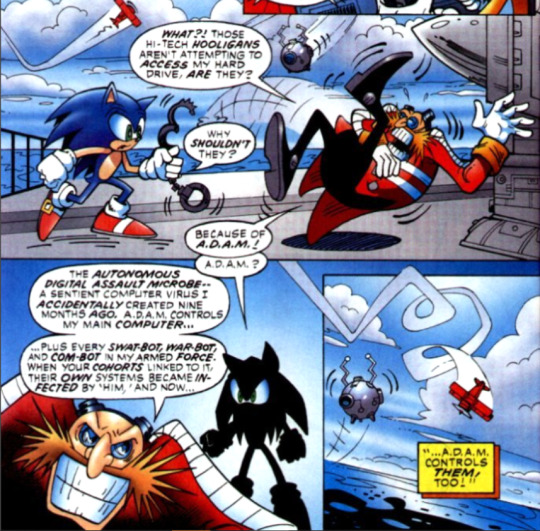
Well that's worrying… Meanwhile at Fort Acorn, as General D'Coolette gets the soldiers under his command ready for battle, Julie-Su argues with Knuckles inside the fort. Knuckles apparently wants to take point in the fight, but Julie-Su is adamant that he not put himself in such direct danger, as now without the power of the Chaos Emeralds, the only power he can rely on is his natural strength, which while formidable pales in comparison. She's doubly worried since last time he put himself in direct danger like this he literally died, but he still insists that he can handle it, pointing to his backup.

Uhh… looks like Amy has seriously powered up since last we saw her! Vector is in charge of heading off the swatbots' first advance, which he does by blasting his music loudly enough that it literally blows all the robots apart before they can reach the fort. While this is going on, Sally, her parents, and Uncle Chuck monitor the situation from the Technolo-Tree, as now that A.D.A.M. has taken control of the Tornado Tails is in serious danger. However, Chuck reasons that with A.D.A.M.'s attention split three ways, he may not be able to properly concentrate on controlling the plane, the missile countdown, and the robot army at Robotropolis effectively. A.D.A.M. forces the controls of Tails' plane down, intending to make him impact with the water of the ocean to kill him, and with M attacking Sonic in revenge for hurting her "father," things look bleak. However, Tails, thinking fast, decides to test A.D.A.M.'s skills with riddles, asking him "Why does the chicken cross…"

I think you've found A.D.A.M.'s weakness, Tails! As he keeps the virus distracted with some more puzzles, Vector laments the destruction of his stereo equipment due to the sheer volume of noise he just unleashed on the swatbots. However, that's only the first wave - and Amy Rose is ready to take on the second wave single-handedly. M starts viciously beating up Sonic while Eggman gleefully "introduces" her to him, noting that unlike A.D.A.M., she was an intentional creation to act as his personal enforcer. She flings Sonic into the water nearby, and Sally, watching from home, is horrified, as she knows Sonic can't swim.

This is kind of the beginning of the era where the comic started to clip Sally's wings. A year spent thinking her closest friend was gone has robbed her of some of her usual fire, and though many people call it out of character for her, while to some degree I agree, in other ways I kind of don't. Sonic is in many ways the opposite of Sally - he rushes into things, acts first and asks questions later, while Sally is much more calculating and prefers to have a plan before jumping into action. With the wild attitude of Sonic gone from her life, she's had her parents in her ears for the past year, once again pushing her to act like a princess and not get involved the way she used to. Instead of being the general, the leader of the rebellion that she's always been, she's being pulled back, reined in, told that she must only direct her troops' movements from the safety of her home. While certainly Sally isn't the type to meekly listen to whatever her parents tell her to do, I think the trauma she's faced has affected her in more ways than even she's aware of, and she's not nearly as certain of herself anymore, leaving her more open to manipulation from her parents than she once would have been.
At Fort Knothole, Amy is only half-conscious after the battle due to exhaustion, but perks up when she's told that she managed to wipe out half the attacking swatbots… on her own. If there's one thing I love about the comics, it's that they never downplay Amy's immense strength. She's a one-woman army in her own right, as long as she has her hammer in hand, and ultimately the comics give her a lot of chances to shine as the badass she is. Everyone prepares to fight the rest of the bots, but a shadow above alerts them to the arrival of the special GUN team from Station Square, heralded by Rouge the Bat. In Old Megaopolis, Eggman tells M that he won't believe Sonic is dead until he sees a body, so she dives into the water, just as Sonic manages to pull himself from the water after finding a lucky ladder close by.
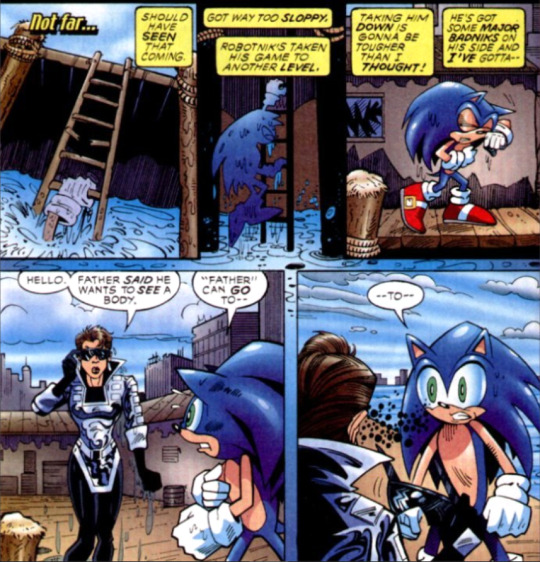
M's eyes begin to glow, glaring at Sonic as she prepares to attack…
Mobius 25 Years Later: The Unveiling
Writer: Ken Penders Pencils: Steven Butler Colors: Jensen
There isn't much teen interaction in this second installment of Mobius 25 Years Later, so there isn't as much to complain about compared to last issue, but there are still a few things to cover. For one, we get our first introduction to Kenders' weird attempts to include some diversity of sexual orientation in his work! We open at Lara-Su's Unveiling, as Julie-Su proudly watches her dance with her father in the middle of the festivities. An echidna named "Mace" arrives, and from his dialogue we can gather that he's Knuckles' half-brother, the one whom Lara-Le was pregnant with before Sonic's space adventures. Julie-Su questions his friendship with a friend of his, Demi-Na, but he insists that the two of them are just friends and it's "nothing serious." She then warns him away from flirting with any of the other people present, as they're all already married. Apparently, Kenders' intention here was to indicate that Mace is in fact gay - that he's not interested in Demi-Na because he's not into women, and that Julie-Su never specified the gender of the people he shouldn't be flirting with. However, there's not even the slightest hint of any of this in the dialogue - y'all know how online fandoms will grasp onto any tiny hint of two same-gender individuals being cordial to one another as being true love and ship them accordingly, but I doubt even the gayest of fans would look at the dialogue surrounding Mace and think "Oh, he's definitely A Fellow Gay!" I do get that at the time this comic was released, acceptance of LGBT individuals wasn't nearly as widespread as it is now, which would actually make Kenders a bit ahead of the curve of society as a whole in terms of acceptance, but this is still a really, really weak attempt at including a gay character in his work - and it's not even the weirdest example yet.
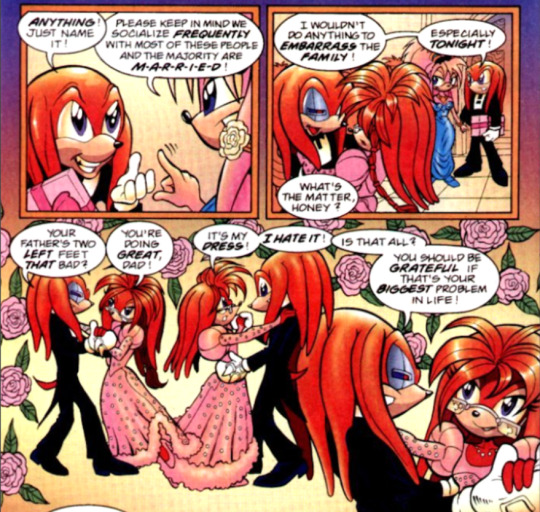
See, even here, something that could have been an opportunity for gentle ribbing from father to daughter is instead used as an excuse to essentially pull a "well, other people have it worse" on Lara-Su. The dress really doesn't suit her personality-wise, making me wonder who even decided that was what she should wear in the first place. Meanwhile, we finally get to meet Cobar, Rotor's old friend, as the two meet up and discuss a very serious matter.
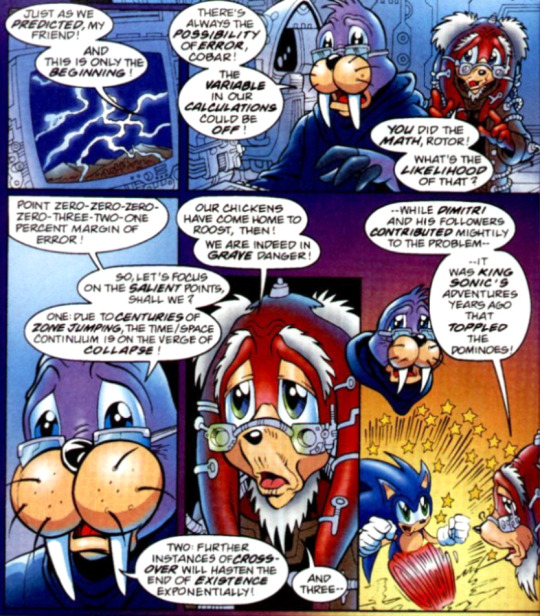
Okay, this is definitely the most interesting thing we've seen so far in this world. This is a problem much more reminiscent of the types of conflicts we see in the main storyline of the comic. However, we're already facing another weird "LGBT inclusion" scenario! Go ahead and take a look at the way Rotor and Cobar interact with one another. Seem shippable to you guys? Well, despite the fact that they seem no closer to each other than two ordinary scientists with a polite working relationship, Cobar is basically supposed to be Rotor's husband! That's right, Kenders apparently always saw Rotor as gay, and while I'm 1000% on board with that interpretation… well first of all Cobar looks like he has one foot in the grave while Rotor would barely be like forty-something in this timeline, but also, again, there is no noticeable hint they they're even slightly into each other, let alone in a long-term relationship. Frankly, Rotor deserves better if we're looking to set him up with a nice man.
Meanwhile, back at the Unveiling, Vector and his son Argyle arrive fashionably late to the party, and Vector and Knuckles step aside to have a chat while Argyle moves in to dance with Lara-Su. Vector frets, thinking that Argyle essentially isn't cool enough to know how to charm a lady, but his fears are totally unfounded.
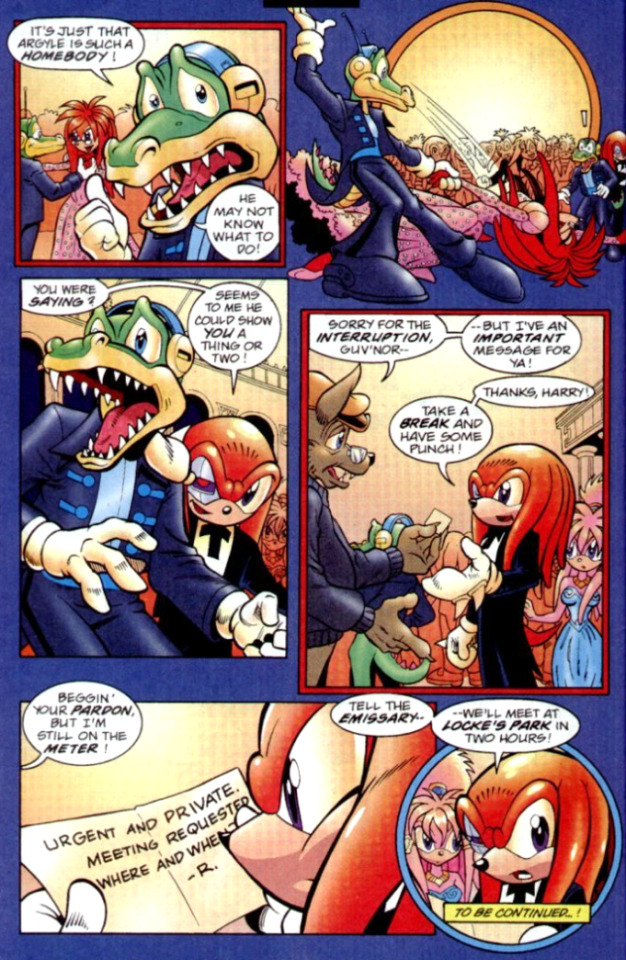
Hmm, seems serious, Knuckles… I'm sure this interesting part of the plot isn't going to get sidetracked by trite teenage drama and a bunch of adults yakking at each other about Adult Stuff, right?
#nala reads archie sonic preboot#archie sonic#archie sonic preboot#sonic the hedgehog#sth 132#writer: karl bollers#writer: ken penders#pencils: dave manak#pencils: steven butler#colors: jason jensen
5 notes
·
View notes
Text
Greta Gerwig & Joe Swanberg: The Penny-Pinching Future of Indie Cinema
By Steve Dollar | March 2, 2009
source: https://www.pastemagazine.com/articles/2009/03/greta-gerwig-joe-swanberg-the-penny-pinching-futur.html
There’s low-budget guerrilla filmmaking and then there’s low-budget guerrilla filmmaking. Greta Gerwig, the 25-year-old star of indie-cinema micro-faves such as Hannah Takes the Stairs, Nights and Weekends and Baghead, recalls an inspiring moment during a visit home to her native California. Making an overnight stop at a motel in Santa Barbara, she flipped through the TV channels until she was stopped cold by something on the local public-access station. There, she discovered a very curious action flick called The Pharaoh Project.
“It was beyond amazing,” Gerwig says, her cadence by turns hesitant and headlong, as she recalls the insane saga about an elite squad of legendary warriors (Genghis Khan! Alexander the Great!) reincarnated to wreak havoc on the modern world. Really, it was like the director and his beefiest bouncer buddies were trying to create a Steven Seagal sci-fi/action epic on a PBR budget. “The most official-looking car they could get their hands on was a cream-colored Toyota 4Runner, but they played it like it was an FBI armored vehicle.
Gerwig, a Barnard-schooled playwright, screenwriter and director, has won glowing reviews for her comedic acting skills, mostly channeled into fetchingly flaky characters as romantically befuddled as befuddling. But even if the Los Angeles Times calls her “an ingénue for the text-message set,” and even if she’s about to start shooting John C. Reilly in her next feature, she still shares a nothing-fancy Williamsburg pad with a roommate. Make fun of The Pharaoh Project all you want. Gerwig won’t. “I just kept watching because there was so much there to admire,” she says. “It isn’t that far removed from the kind of movies I’ve made. The ‘let’s just go do it’ attitude. We’re interested in different things. I’m interested in the million tiny deaths that occur in everyday human interactions, and they’re interested in sweet-ass roundhouse kicks. But the motivation to make something is similar.”
Along with her friend and sometime collaborator Joe Swanberg, 27, Gerwig is one of the most prolific characters in a new wave of young filmmakers lighting up the indie landscape. The past few years have seen the arrival of a slew of talented, original directors who have thrived despite—and sometimes because of—miniscule budgets and improvised means: The list includes the Duplass brothers (Baghead), Aaron Katz (Dance Party, USA; Quiet City), Todd Rohal (The Guatemalan Handshake), Ron Bronstein (Frownland), Mary Bronstein (Yeast), Craig Zobel (Great World of Sound), Ry Russo-Young (Orphans, You Won’t Miss Me), Frank V. Ross (Hohokam, Present Company), Kentucker Audley (Team Picture), Jeff Nichols (Shotgun Stories) and Andrew Bujalski (Funny Ha Ha, Mutual Appreciation).
Early on, Bujalski’s sound mixer, Eric Masunaga jokingly referred to one of the films as “mumblecore,” and the label stuck for a while. It was catchy, and spoke to the indie-rock flavor of efforts like Swanberg’s LOL, in which urban post-grads stumble in and out of relationships, bands and poorly furnished apartments, endlessly discussing feelings they can’t always articulate. The use of consumer-grade handheld digital-video cameras, spontaneous dialogue and casts comprised mostly of other budding directors are also common tendencies, although by no means exclusively so. Katz gives his actors scripts. Bronstein, who co-starred with his wife Mary in the Swanberg-shot Web series Butterknife, works in 16mm. So does Zobel. Not everyone digs Final Cut software. In other words, these filmmakers are hardly clones—but they have more in common with one another than they do with everyone else.
This movement, as such, has branched out as Swanberg and his peers have begun to mature after years of film festivals such as Austin’s annual SXSW, which became a flourishing seedbed for the movement around 2005.
“The technology changed in the mid-to-late ’90s,” Swanberg says, giving his socio-cultural analysis as he takes a chair next to Gerwig in a photographer’s studio near the Manhattan Port Authority. It’s a brittle winter evening after a day of hiking around bleak locales in upstate New York, where the pair posed as Depression-era vagabonds—even as all-too-real panhandlers proliferate on the streets outside. “The resolution got better, and the Internet allowed social networking to happen like it hadn’t before. The threat of the actors strike in 2001 that paved the way for a lot of reality TV to hit the mainstream made a huge impact on the way mass audiences perceived handheld video. Because they got used to watching it, all in one year, with Survivor and every other show that came along shot in a run-and-gun style on a small camera.”
It wasn’t long before young filmmakers hit the festival circuit with their own low-budget projects, though, as Swanberg notes, “A bunch of celebrities had to make movies on [digital video] to legitimize it. Ethan Hawke had to make one, and Richard Linklater and Robert Rodriguez. Jennifer Jason Leigh and Alan Cumming made The Anniversary Party, and everyone said it was cool, and even then it took a lot longer.”
Swanberg began shooting so-called “webisodes” in 2005 with Young American Bodies, a series for the erotically minded Nerve.com, which reflected the diaristic—OK, blog-like—intimacy of his features. “This whole idea of exposing very personal inner thoughts to a general public whether they wanted it or not seemed really crazy five years ago,” he says. “But it was around the same time that these smaller movies started to do something similar: I’ll tell my story and my friend’s story. If it plays festivals and people see it, great, and if it doesn’t, it still exists. I made my first two movies for less than 3,000 bucks.”
That vow of insularity can’t stick forever, though. Swanberg’s new film, Alexander the Last premieres March 14 at SXSW and, on the same day, becomes available by demand on IFC, as part of its Festival Direct series. The idea, Swanberg explains, is to make the film broadly accessible while it’s still playing festivals, and not wait for interest to fade. “The way people are watching stuff is changing,” he says. “If I don’t start putting these movies out very quickly they will start backing up on each other. Theatrical distribution doesn’t make sense anymore.”
Benten Films, a DVD outfit run by two film critics—Andrew Grant of FilmBrain.com and Aaron Hillis of GreenCine.com—has done an impressive job of packaging and promoting work by Swanberg and fellow indie upstarts like Audley, Rohal and Katz. But it’s not easy. “There aren’t enough distributors to go around,” Hillis says. “If you’re an independent filmmaker there are not a lot of options out there. There’s no more middle class. It’s just a matter of time before it becomes either The Dark Knight or mumblecore, with nothing in between.”
If that’s the case, Swanberg’s work doesn’t suffer from a smaller screen. Alexander—a slender (72 minutes) but quietly observant drama that says as much with silence as with its improvised dialogue—is lucky to have an irresistible center of gravity in Jess Weixler (Teeth), a rising star whose face is a delicate map of feeling. About nothing if not process, the film charts the keenly attenuated emotional swings of Alex, a young actress drawn to her handsome co-star Jamie (Barlow Jacobs) while her rock-musician husband is on the road. To further complicate matters, she has introduced the fresh-from-Kentucky Jamie to her older sister Hellen (Amy Seimetz), who actually engages in the fling Alex and Jamie pretend to have onstage. The milieu may not be too far away from the tempest-in-a-beer-can angst of The Real World, but the spirit is much closer to the bedroom intimacies of the French New Wave. Yet, even if Swanberg’s actors are at home with casual nudity and candid couplings, their journeys of self-discovery are not linked to a larger political or philosophical agenda. They prefer singing their own songs and tinkering on thriftshop keyboards to dropping postmodern allusions to art and cinema. Their point is not to be clever, but to be honest. The film also broadens Swanberg’s professional circle. Jane Adams (Happiness) takes a small but key role, and Brooklyn filmmaker Noah Baumbach (The Squid and the Whale), for whom Swanberg has been working as a cameraman and assistant director, helped produce when another project failed to jell. Likewise, the Duplass brothers, whose ambitions skew more mainstream, have cast John C. Reilly, Marisa Tomei and Jonah Hill for their next comedy. And Reilly also takes the lead in Gerwig and collaborator Alison Bagnall’s Funny Bunny.
“There’s an audience now, and I’m wanting things I didn’t want before,” Swanberg says. “I want to shoot in other cities now, and I want to shoot in HD. I want to rent apartments, and I want sailboats and all these other elements. But before, I was content with a few people in a room.”
Gerwig—who spent the past year racking up performances in neo-grindhouse genre flicks like Ti West’s House of the Devil and a non-mumblecore indie in which Iggy Pop plays her dad—has a good laugh about her efforts to go Hollywood. “I’ve made a bunch of audition tapes,” she says. “I start cracking up because I can’t get through the scenes. Some of them, I have to cry and say things in Southern accents.” She drifts into her best Scarlett O’Hara: “Johnny did not kill that bay-buh! I killed it! Because I hated it!” Nonetheless, the actress confesses, sure, “I’d love to be the girl in the dinosaur movie.” Well, OK, maybe a movie with little plastic dinosaurs.
Gerwig says she was astonished to learn that the guys who made Cloverfield are fans. “The woman who casts Gossip Girl loves Aaron Katz. What!? But maybe I’m not supposed to say that. The number of people who are around watching you out of the corner of their eye is amazing.”
Swanberg—whose output has increased since he brought on Anish Savjani (Wendy and Lucy) as a producer—won’t likely be taking on any Cloverfield sequels, even with his handheld-video skills. If his films don’t make money, he’ll still shoot. “It’s a compulsion for me,” says Swanberg, who also finds time to continue acting in his friends’ movies, shooting Web projects and helping his wife, Kris Williams, with both her filmmaking and burgeoning gourmet-ice-cream business. “It’s not like I started doing it because I was good at it. Nor is it that I continue to do it because I’m good at it. I do it because I can’t help it, and I don’t know what else to do. I already know there will be a period when I will make 10 of them that nobody sees or likes or writes about. But the reason why I will continue through that period that nobody cares is not because they will care again but because I can’t help it. It’s selfish. I’m making these things for me.”
0 notes